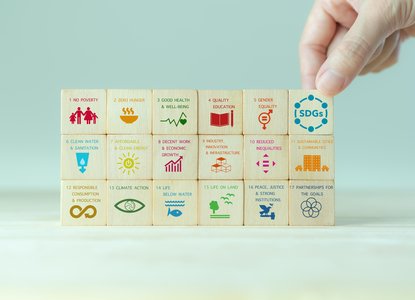Three reasons why the Financing for Development Outcome Document should commit to ending company secrecy

Photo by Henrique Ferreira on Unsplash.
Knowing who ultimately owns, controls, and benefits from companies, other legal entities, and certain high-value assets is crucial for effective public resource mobilisation. Implemented effectively, a global system of interconnected beneficial ownership (BO) registers will ensure that transnational economic activity supports resource mobilisation to invest where it is most needed, while also stemming illicit financial flows.
Ahead of the 4th Financing for Development (FfD4) Conference in Seville, the FfD4 process has so far highlighted the importance of beneficial ownership transparency (BOT). It has focused on to what extent United Nations’ (UN) Member States should commit to BOT, both at the domestic level (by strengthening efforts to implement effective domestic BO registers), and the international level (by improving the sharing of information contained in these registers to tackle corruption and tax abuse).
We know that using BO data works. As a result of the Panama Papers leak in 2016, governments around the world recovered over USD 1.2 billion in revenue within three years. In Latin America, 16 countries have identified nearly EUR 28 billion of additional tax revenue through exchanging BO and other relevant data.
Although the first draft of the FfD4 Outcome Document currently contains strong foundations for effective BOT, as we get closer to the Conference, Member States still need to agree on the appropriate level of ambition that such a document should contain. This involves both political commitment to advancing solutions like BOT, and clarity on some technical matters to ensure that the commitments made in Seville can be effectively taken forward.
Here are three main reasons why FfD4 should commit to ending company secrecy, and how it can do it:
1. Companies are the #1 vehicle of choice to launder money: FfD4 can strengthen domestic transparency
Legal entities are an attractive way for criminals to disguise their identity and (mis)use them to launder money and conduct other financial crimes. By establishing robust, effective, and high-quality domestic BO registers for legal vehicles, countries can mitigate these risks by collecting reliable data on who owns, controls, or benefits from them.
Ensuring the FfD4 Outcome Document contains strong provisions to not only implement high-quality domestic BO registers, but also doing this with standardised information and appropriate collaboration mechanisms to exchange such information with other jurisdictions will maximise the data’s usability and potential to tackle financial crimes.
Although existing standards such as the Financial Action Task Force Recommendations and the Organisation for Economic Co-operation and Development (OECD) tax transparency standards provide the international policy foundation for the implementation of BO registers and the exchange of information, meeting these legislative and technical standards is costly and time consuming. For instance, only six African countries have made it over the necessary hurdles to comply with the OECD’s Common Reporting Standard, and while this number is expected to double by 2026, it will still represent less than a quarter of the continent.
Including a bold commitment within the UN framework to extend the direct use and exchange of information from BO registers will complement and reinforce these standards, leveraging progress made to improve their effectiveness. This is essential to make the benefits of BOT more globally inclusive, in particular for emerging economies or developing countries where tax abuse and other forms of financial crime have a disproportionately negative impact.
2. Asset ownership transparency can contribute to closing the tax gap: FfD4 can transform the international tax information infrastructure
There are many cases of high-net-worth individuals avoiding taxes by holding their wealth in companies and similar legal structures, especially when ownership networks span multiple countries. Knowing who owns what –and where – would contribute to closing the tax gap by identifying assets that are subject to taxation, allowing for more revenue to be collected. Greater international cooperation is also needed to achieve this.
The FfD4 draft Outcome Document contains an ambitious proposal to work “towards establishing a global beneficial ownership registry covering a wide range of assets, legal entities and legal arrangements, such as companies, trusts, and limited liability partnerships”. The opportunity is significant here to truly transform the international data architecture.
Of course, many technical questions remain, including what this should look like, how to leverage rather than duplicate existing efforts, and what assets to cover. The draft Outcome Document provides an overall policy direction, and technical details can be effectively addressed through a post-FfD4 process, such as an expert meeting. In Seville’s Outcome Document, Member States should focus on the outcome that this can achieve: by linking BO data from assets and legal entities from across the world, this commitment can transform the ability of tax authorities to effectively raise revenues by taking them from partial and nationally siloed information on asset ownership, to much more direct and comprehensive information on BO networks needed for effective tax administration.
3. Corruption hinders investment where it is most needed: FfD4 can expand and build on existing UN commitments to BOT
Enabled by secrecy, corrupt individuals and multinationals can siphon funds away from their countries, preventing governments from obtaining the necessary resources to invest in education, health, and housing. A recent study has proven that a “1 percent rise in the transparency level (low corruption) will enhance the real GDP growth by 0.20 percent in the long run”.
In 2021, the UN General Assembly issued a Political Declaration committing to enhancing BOT and enabling adequate, accurate, reliable, and timely BO information being accessible to those who need it. In 2023, the 10th Conference of State Parties for the UN Convention Against Corruption (UNCAC) also recognised the value of BO information to fighting corruption and tackling illicit financial flows in its Resolution 10/6, aiming to maximise political momentum to use BO information for recovering and seizing stolen assets.
The FfD4 should build on the UN’s past commitments and reinforce these efforts by establishing clear, ambitious, and actionable commitments to not only enabling BOT, but also regulating professional service providers (enablers in many cases of corruption), fully implementing the UNCAC, and enhancing international cooperation with civil society organisations and the media, both of which play a key role in exposing wrongdoing.
Conclusions
Fundamentally, BOT of legal entities and assets is about how and where (economic) power is held and transferred within society in order to hold it to account. BOT can provide significant information to ensure progressive tax systems and the appropriate taxable rights are in place to reduce inequality, strengthen financial accountability, and promote sustainable economic growth.
The upcoming FfD4 Conference has the potential to play a pivotal role in leveraging progress to date by setting ambitious and practical objectives for the coming years which put BOT front and centre in the UN agenda. This is particularly relevant in light of the upcoming negotiations for a Framework Convention on International Tax Cooperation and the pressing need to provide authorities with the necessary information to effectively collect tax revenues.
If Member States can preserve the ambition of BOT set out in the First Draft of the Outcome Document, we may well look back in five years and see Seville as a moment that paved the way for leveraging ownership transparency to unlock more public resource mobilisation and boost development efforts where they are most needed.
